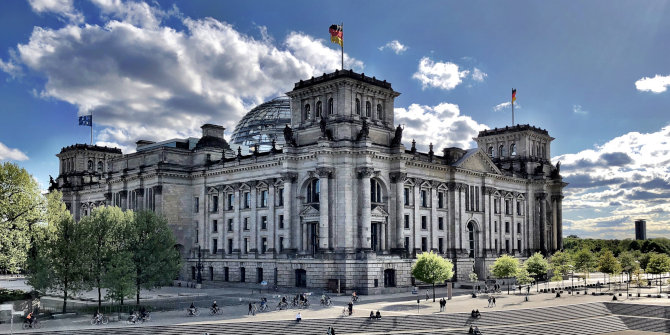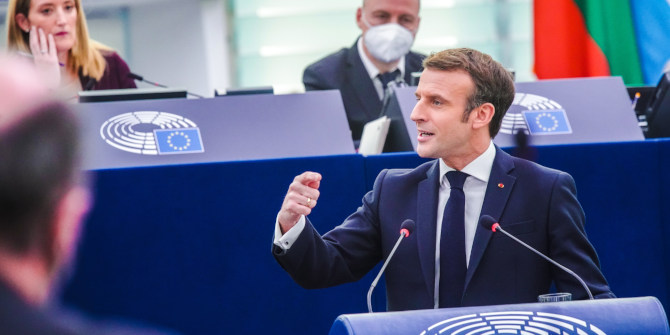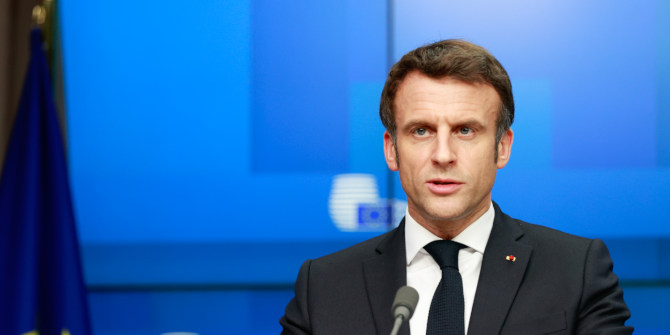 Germany’s once stable party system has undergone substantial change in the last few years. Julian Göpffarth writes that while 2019 has so far promised to be less chaotic, upcoming EU and state elections are likely to stir up tensions that politicians have worked hard to overcome.
Germany’s once stable party system has undergone substantial change in the last few years. Julian Göpffarth writes that while 2019 has so far promised to be less chaotic, upcoming EU and state elections are likely to stir up tensions that politicians have worked hard to overcome.
Looking at German media one might be struck by the absence of the upcoming European elections. Only a few articles and tv shows are talking about the election, which is likely to strengthen Eurosceptic and far right parties. Nevertheless, any observer of German politics can see that the parties have used the first months of the new year to prepare not only for the European elections, but also for elections this autumn in three of the five East German states. In all three, the AfD is predicted to become at least the second or third strongest party, challenging the incumbent SPD in Brandenburg, conservative CDU in Sachsen and the far left Die Linke in Thüringen.
Given this threat of defeat and an unprecedented far right victory, domestic topics have so far dominated the political debate. Besides Die Linke and the AfD’s struggle to decide on whether to support or fundamentally oppose the EU, European politics and policy-making have largely been absent from the political debate. Instead, what has come to the fore has been heated discussions over rising particulate pollution and impending driving bans for diesel fuelled cars in some major German cities.
Only over the Carneval, a period that parties usually use to sharpen their profile, was Europe put on the agenda, albeit in very general terms. While the Greens and SPD responded directly to Macron’s new initiative for reforms of the EU and called for more solidarity and integration in the EU, the AfD declared solidarity with Hungary’s Viktor Orban in his rift with the European People’s Party. The liberal FDP called for a liberal relaunch of Europe to counter populism, while the CDU and CSU called for a united EU that focuses less on regulations and more on the protection of its borders, as well as the exclusion of Turkey. For all parties, Brexit played only a minor role.
Overall, the party that so far has probably had most attention on its side is the Social Democrats (SPD). This is something of a small surprise given the months of self-flagellation they endured after the crushing defeat of ex-SPD leader and former candidate for chancellor Martin Schulz in 2017. The past two years have been a disaster for the party and polls in East Germany promise further painful losses this year. Yet, the SPD has not only managed to use the last few months to question the contested Hartz IV reforms it had itself introduced under chancellor Schröder in the early 2000s, but also to present an array of welfare state policies and reforms that cater towards a classic social democratic electorate.
Similarly, under new leader Annegret Kramp-Karrenbauer (AKK), Merkel’s CDU has tried to appeal to a more conservative electorate by reassessing the decisions of the year of the so-called 2015 refugee crisis. A series of ‘workshops’ were organised to give space for an open debate on what went wrong in recent years. As a consequence, the party has been able to stabilise its position at around 30 per cent in the polls. However, it has been far less successful than its social democrat coalition partner in setting the political agenda.

Credit: ANBerlin (CC BY-NC-SA 2.0)
Reactions to the renewed attempt to polarise German politics oscillate between indifference, scepticism and enthusiasm. After years of perceived cartelisation, both parties’ more or less well-performed turn to their orthodoxy is, it seems, not entirely trusted. This might explain why, despite more than half of Germans supporting the SPD’s proposed reform of the pension system, the party has only gained two more points in the polls, moving level with the Greens at around 17%. Besides the European elections, a first test of whether the party’s change of course will help in securing better election results will be the elections in Bremen in May. In the north German city state, the SPD has been in government continuously since the end of World War II. Losing would thus represent another strong blow to the party.
At the inner party level, the pledge for renewal and a return to the parties’ ‘core values’ has paid off and helped to calm dissent that had been growing in the party base over recent years. Yet, it has equally strained the CDU-led government coalition. In fact, some expect that both parties’ renewals may lead to the split of the coalition. This will largely depend on the results of the European and state elections.
Given the dominant debate on the future of the CDU and SPD, the other parties have struggled to gain attention. While the AfD and the Greens dominated headlines and soared up the polls in 2018, both have so far largely failed to set the agenda ahead of the upcoming elections. In light of the SPD’s move to the left, the Greens have signalled a shift towards a more economy-friendly profile, arguably also to prepare for a possible coalition with the CDU. In a joint interview, CDU-leader AKK and leading Green party member Katrin Göring-Eckardt presented each other as possible partners in a future coalition.
The Greens continued strength as well as the CDU’s increasing tensions with the SPD mean that a so called Schwarz-Grün coalition in Germany appears to be a viable option to follow after almost 10 years of grand coalitions. If both the SPD and CDU were to suffer further losses in the upcoming elections, a breaking apart of the coalition is unlikely but not impossible. In such a scenario, Schwarz-Grün would be the first option for AKK, especially as the conservatives’ former preferred coalition partner, the liberal FDP, is struggling to go beyond 10 per cent in the polls.
While unpopular among Green party members, such an alliance could strike a chord with voters in general. Yet, it would also be a welcome present for the AfD. While the AfD remains strong in the polls in East Germany, it has lost support in the polls and traction in the national debate. The headlines on the party were largely dominated by news of dubious party donations and an announced observation of its radical right wing by the domestic security agency. Nevertheless, a strong AfD performance in both the EU and state elections could severely challenge AKK’s leadership and once again lay bare the split between the party’s liberal and conservative wing. What is more, the CDU will have to face an uneasy decision over whether to form a coalition with the AfD in Saxony and Thüringen – an option that many in the party base are far from opposed to.
So far, 2019 has carried the promise that German politics can become more polarised again but without endangering stability – a principle held dear by politicians and voters alike. However, the upcoming elections are likely to stir up tensions and may reveal that in times of party fragmentation, polarisation is likely to entail instability.
A first taste was given on Ash Wednesday, which German politicians traditionally use for polemical analysis of the current political situation. AKK used the occasion to give an astonishingly emotional speech arguing against an increasing policing of language, political correctness and calling the German people the “most inhibited people of the world”. She also promised to give a central post to CDU conservative favourite Friedrich Merz in a possible AKK cabinet after Merkel – words that chime with the party’s conservative base and many AfD supporters.
This choice of words was not without risk. The speech met with a strong critique from the SPD and the Greens but also succeeded in shifting the general debate from the SPD to the CDU. However, if the CDU moves in the direction AKK laid out in the speech, then cooperation with the centre left will become more unlikely. Whether both the SPD’s and CDU’s return to their roots will allow them to regain lost voters will be shown in the coming elections. In any case, 2019 promises to be yet another year of fundamental political shifts and unprecedented political coalitions in Germany.
Please read our comments policy before commenting.
Note: This article gives the views of the author, not the position of EUROPP – European Politics and Policy or the London School of Economics. Featured image credit:
_________________________________
 Julian Göpffarth – LSE
Julian Göpffarth – LSE
Julian Göpffarth is a PhD candidate at the at the London School of Economics. He holds a degree in European Studies from Sciences Po Paris and the London School of Economics and Political Science. Prior to his PhD he has worked for the European Parliamentary Research Service. His research interests include nationalist ideologies, radicalisation, European politics and philosophy.





